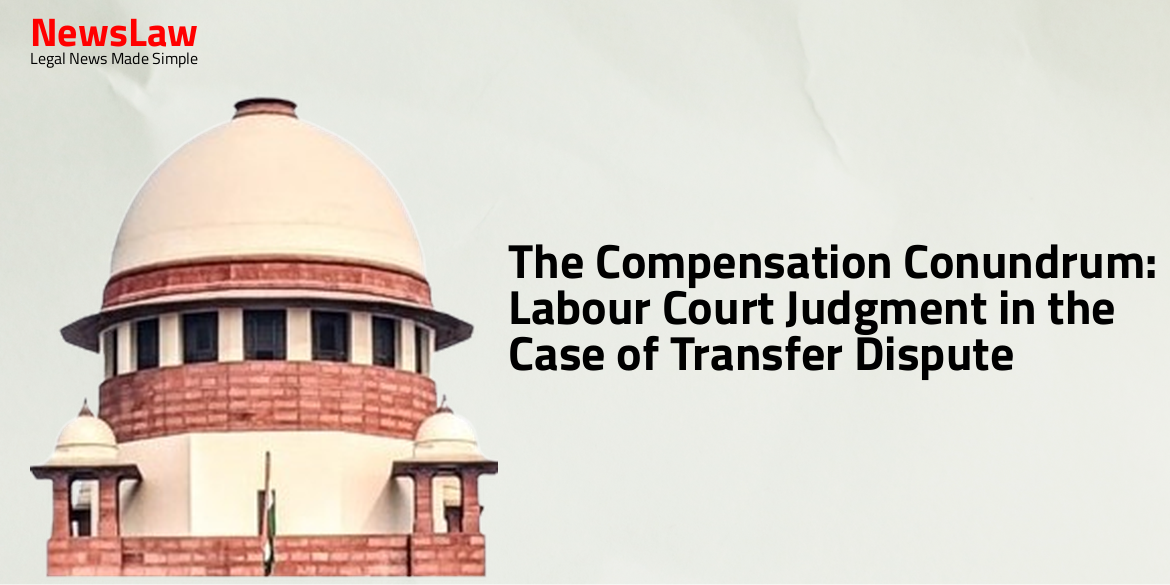Delve into the intricate legal analysis by the court regarding readiness and willingness in specific performance cases. The court’s thorough examination of the parties’ conduct, obligations under the contract, and crucial factors determining eligibility for specific performance remedies provides valuable insights into contract law. Discover the significance of ‘readiness and willingness’ as pivotal conditions for obtaining specific performance relief in complex legal disputes.
Facts
- The respondent filed a suit for specific performance, seeking a refund of the advance amount with interest when the balance consideration was not paid within the stipulated time frame.
- The appellants alleged that the respondent was aware of the mortgage on the property and had agreed to discharge it from the sale consideration.
- The trial court decreed the suit for specific performance in favor of the respondent.
- There was no communication between the parties regarding the transaction on the completion date, indicating the respondent’s lack of willingness to perform the contract.
- The respondent claimed readiness and willingness to perform the contract by citing various actions and communications with the appellants.
- The High Court allowed the respondent to withdraw the balance consideration deposited during the trial.
- The respondent’s suit for specific performance was barred by the appellants citing Order II Rule 2 of the CPC due to a previous suit filed by the respondent for permanent injunction.
- The respondent sought a mandatory injunction to compel the execution of documents for the transfer of the property.
- The High Court upheld the judgment of the trial court and the first appellate court in a second appeal.
- The trial court decreed the suit in favor of the respondent and directed the respondent to deposit the balance consideration of Rs. 90,000 within a month.
- The court accepted the respondent’s argument that the advance amount of Rs. 10,000 was paid to discharge the mortgage.
- The Single Judge of the High Court dismissed the second appeal and upheld the judgment of the trial court and the first appellate court.
- The High Court held that the discharge of the mortgage by the appellants was a condition precedent for the completion of the sale transaction.
- The trial court observed that the respondent had sufficient means to purchase the property and that the appellants made no demand from the respondent to discharge the mortgage liability.
- The High Court confirmed the decree for specific performance and affirmed the decision of the first appellate court against the decree for specific performance.
- The Court clarified that ‘readiness’ refers to the financial capacity, and ‘willingness’ refers to the conduct of the plaintiff wanting the performance.
- The trial court treated it as a suit for specific performance of the contract and held that the mortgage debt was discharged before the sale deed could be executed.
- The suit was found not barred by limitation as it was filed within three years from the date of discharge of the mortgage.
- The appellant’s appeal before the Principal District Judge, Coimbatore, was dismissed, leading to a second appeal filed before the Madras High Court.
Also Read: Electoral Malpractices in Mayor Election
Issue
- Core of the dispute is whether the respondent-plaintiff has performed or has always been ‘ready and willing’ to perform obligations under the contract.
- Issue revolves around the respondent’s performance or readiness to perform essential terms of the contract.
- Section 16 of the Specific Relief Act outlines bars to specific performance, including failure to prove readiness and willingness to perform essential contract terms.
- Averment and proof of performance or readiness is crucial for specific performance relief.
Also Read: Balancing Power and Transparency: Electoral Bonds Struck Down, Disclosure Mandated
Arguments
- Respondent-plaintiff stated readiness to pay balance consideration and execute sale deed upon discharge of mortgage
- Time was not considered essential in the contract based on terms and conduct of parties
- Appellants were obligated to discharge the mortgage before respondent could pay balance consideration
Also Read: Recall of Resolution Plan Approval: Legal Analysis
Analysis
- In decreeing the suit for specific performance, the Court considered various factors such as readiness and willingness of the plaintiff to perform the contract and the conduct of the parties involved.
- Several past cases were referenced to establish the importance of readiness and willingness in specific performance suits.
- The Court emphasized the need for proper scrutiny of the plaintiff’s conduct to determine willingness in fulfilling the contract.
- Cases like KS Vidyanadam, Nirmala Anand, and His Holiness Acharya Swami Ganesh Dassji were referred to in relation to specific performance of contracts for immovable property.
- The escalation of property prices and the efflux of time were also key considerations in determining the appropriateness of specific performance as a remedy.
- Factors such as unjust enrichment, inconsistency in behavior, and delay in filing suit were highlighted as critical in assessing the eligibility for specific performance.
- The need to avoid causing injustice to any party, especially one not at fault, was reiterated in the context of granting specific performance remedies.
- The discretion conferred on the Court by Section 20 of the Specific Relief Act was discussed in relation to specific performance suits.
- The importance of ‘readiness and willingness’ as a condition precedent for obtaining the relief of specific performance was underscored in various cases.
- Agreement did not specifically record the mortgage over the suit property.
- The respondent failed to prove readiness and willingness to perform the contract.
- No evidence provided by the respondent indicating calling upon the appellants to perform obligations or discharge the mortgage within stipulated time period.
- Failure of the respondent to reach out to the appellants even after expiry of six months.
- Appellants were obligated to execute the sale deed free from encumbrances on receipt of balance consideration.
- Respondent’s lack of communication with appellants regarding mortgage discharge and delay in filing suit indicates lack of will to perform contract.
- Inconsistencies in respondent’s conduct and withdrawal of balance consideration deposited before trial court.
- The respondent-plaintiff exhibited blemished conduct in indicating willingness to perform the contract
- Specific performance of the contract is declined due to this conduct
Decision
- The appellants are directed to refund the advance amount of Rs. 35,000/- received from the respondent
- Refund to be made with interest at the rate of 6% per annum from the date of filing of the suit for specific performance by the respondent
- Pending applications to stand disposed of
- The appeal is allowed and the judgment of the High Court of Judicature at Madras dated 7 January 2019 is set aside
- Order for a refund of the consideration along with interest at 6% per annum
Case Title: SHENBAGAM Vs. KK RATHINAVEL (2022 INSC 75)
Case Number: C.A. No.-000150-000150 / 2022



